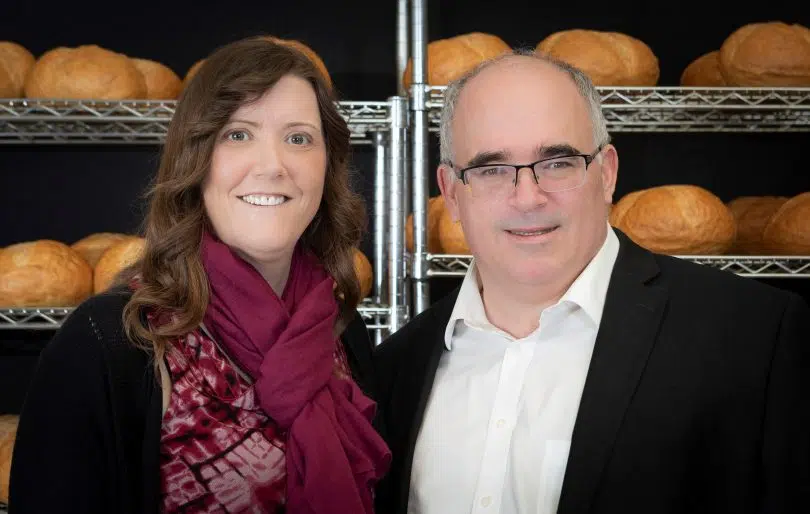
Rosalyn and Blair Hyslop. Image: Submitted
The owner of a major New Brunswick bakery is stuck between a millstone and a hard place, trying to pick the right price for flour.
Blair Hyslop, co-owner and co-CEO of Mrs. Dunster’s bakery in Sussex, told Huddle he’s facing double-digit price increases in flour, his biggest expense, at a time when he and his wife, co-owner, and co-CEO Rosalyn Hyslop are preparing to buy it.
The Hyslops are trying to navigate an uncomfortable and uncertain situation as flour suppliers offer to lock a price for future shipments as domestic flour prices skyrocket.
Hyslop said he risks either getting locked in with a higher-than-necessary price or not choosing a price quickly enough and missing an opportunity to secure a lower price before things get even more expensive.
“It’s unusual right now because it’s not something where you usually have to deal with these major swings, year-over-year,” Hyslop said. “The last time we saw something like this happen in the industry was 2008, so it’s been a while.”
Hyslop said that before the Russian invasion of Ukraine, flour was already getting more expensive, with prices up 53 percent this year. Ukraine is one of the world’s largest suppliers of grain. Russia’s unprovoked invasion has sunk hopes of a good growing season in Ukraine and put pressure on other markets, like Canada and the U.S.
“The price of flour has been on the rise for the last 18 months or so but flour is a commodity… it’s traded and Russia and Ukraine represent 30 percent of the world’s flour supply,” said Hyslop.
“Countries that used to buy from those markets can no longer do that, so the assumption is that they’ll move to other suppliers, including Canada and the U.S. And that puts upward pressure on the… price.”
Displaced Demand
With drought having hurt grain yields in Western Canada last summer, and uncertainty around the coming season, Hyslop said things are getting harder for Mrs. Dunster’s, which uses about 4-million pounds of flour a year.
He said there are only a handful of companies that mill flour in Canada so he only has a few options. Mrs. Dunster’s relies on flour milled at facilities in Halifax and Montreal, from suppliers in the Prairies.
“I’m not sure farmers in Canada can plant enough to make up for the increase in global demand,” said Hyslop, who is a member of the National Bakery Association of Canada’s board.
“We’re at the mercy of the markets, so our only option is to adjust our prices and that’s challenging in Canada because it’s not easy to pass on price increases to retailers.”
Flour isn’t the only pressure for Hyslop.
“We have to go to 600 stores a couple of times a week and we all see what’s happening to gas,” he said.
He noted that with the higher costs of fuel–as well as eggs, sugar, salt, cooking oil, and yeast, to name a few–it’s getting increasingly pricier to do business.
These pressures could eventually lead to cutbacks on sales to certain customers or production of certain products.
“The problem is margins are so high in this business that when your costs go up, you really have to be careful about what you’re making and selling. We’re pinching pennies every day and cutting costs where we can and trying to get through this period.”
Hyslop has co-owned Mrs. Dunster’s, a company that employs about 200 people, for almost eight years. The company runs two factory-bakeries in New Brunswick; a 40,000-square-foot facility in Moncton that specializes in bread, rolls, and pizza shells; and a 30,000-square-foot centre in Sussex where it bakes cookies, donuts, and other confectioneries.
Sam Macdonald is a reporter for Huddle, an Acadia Broadcasting content partner.






